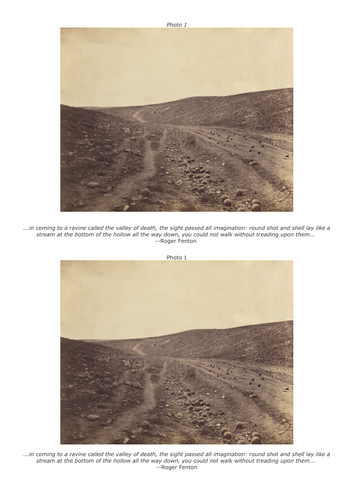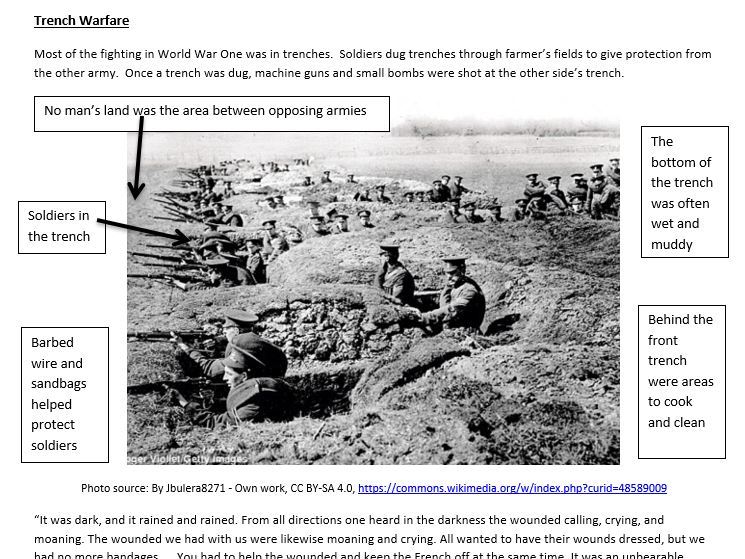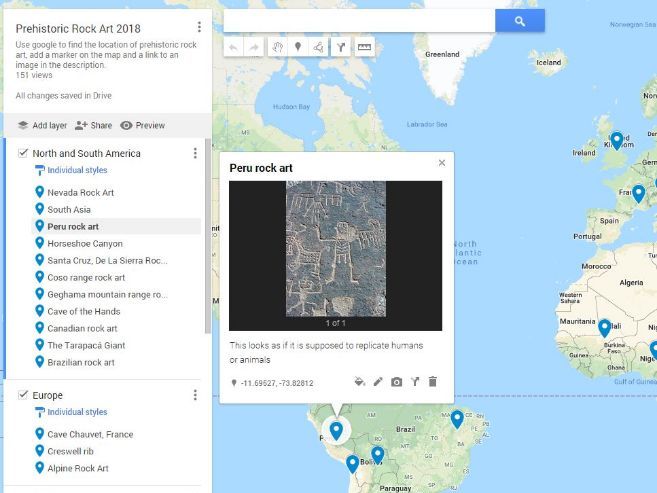15Uploads
63k+Views
53k+Downloads
History

Identify, Describe, Explain, Photo Analysis
This lesson is designed to help emphasise the difference between the instructions 'identify', 'describe' and 'explain'. It is also good practice of thinking critically about primary sources. It is set in the Crimean War and touches on the Charge of the Light Brigade. Students analyse two photos to try and decide which came first then listen to the RadioLab podcast to hear how a Historian went through the process of trying to figure it out.
This could also be useful for Media lessons looking at photos staged for effect.

World War I Overview Worksheet
A worksheet designed for using as relief for 1-2 hours individual work. It gives an overview of World War One. It looks at the start, who fought, how many were affected, trench warfare and the Rememberance poem. Skills covered are reading for detail, mapping, graphing, image interpretation and poetry. A map of Europe in 1914 will need to be sourced and provided to students to accompany this task 2 of this activity.

Six the Musical: Six Wives of Henry VIII
How accurate is the musical “Six” at portraying the wives of Henry VIII? Students research and compare the musical’s songs to historic events to draw their own conclusions.
The popular musical is a modern retelling of the stories of the six wives of Henry VIII. Each has her own song to highlight her life with Henry. In this activity, students must take the song, research some key lyrics (provided) and conclude how accurate the portrayal.
Students will need internet access to complete this activity. It should take 1-2 hours depending on ability and thoroughness.
All music can be found on Spotify and YouTube. Note: the lyrics do not downplay the sexual promiscuity of the era, this is not suitable for younger students.

GIS Rock Art Lesson Plan
A collaborative lesson plan where the class works together to create a world map of Prehistoric Rock Art. Great to introduce them to GIS on Google Maps and an interesting topic to map. Students use Google Maps to locate examples of prehistoric rock art then “tour” the world comparing the different styles. Lesson plan includes how to set up Google Maps for a smooth lesson start.
This could be differentiated by providing students with examples of rock art to map, rather than getting them to research themselves.

History Mystery: Murder of Lord Darnley
Analysis activity using both primary sources and historian’s research focusing on the answering “Was Mary, Queen of Scots, involved in the murder of Lord Darnley?”. Students must consider usefulness and reliability including and must take care not to be tricked by a casket letter!
The links to the six sources, and accompanying questions, will scaffold students through the analysis with a prompt at the end to weigh up all the information and make their own judgement.
This could be run as an individual, webquest type activity or in class with printed resources.
A Powerpoint is also provided (with the questions) to run in a classroom setting if desired. It will take 1-2 hours depending on the ability of the class. Answers provided.

Different Calendars
This lesson recognises that time is created by humans and different people can, and do, measure the years in different ways. The lesson starts by identifying the Western, Gregorian, calendar has Christian foundations yet the days and months do not have Christian names. The lesson goes on to consider different numbering systems, as well as lunar and suggested calendar systems. The second half of this lesson gets students to research these systems in small groups and present their findings to the class.
Students will need access to the internet/relevant books and basic research skills for this lesson.
This could follow on from my other lesson titled “how do dates work”.

How do dates work?
Students learn about chronological order, AD and BC, decades and millenia.
The lesson starts by defining the word “chronological” and actively practicing putting dates in chronological order. Then it explains AD and BC before practicing putting those in order. The lesson continues to look at decades, centuries and millenia before finishing with a link to a relevant Kahoot. Lots of activities to allow students to practice, you can even get students out of their seats and get them to put people in the right order.
Depending on the age and ability of the class, this will take 30-60 minutes.







